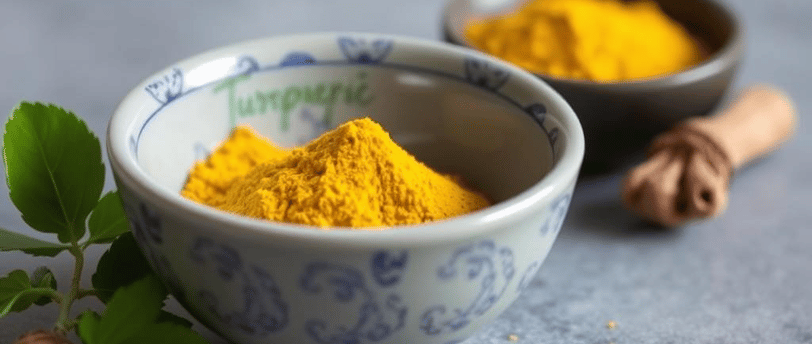Turmeric for Digestion: Unlocking Your Gut's Potential with Anti-Inflammatory Power
🥗DIGESTIVE HEALTH


For centuries, turmeric has been a staple in Ayurvedic and traditional Chinese medicine, prized for its vibrant color and potent health benefits. While its use in culinary dishes is well-known, turmeric's impact on digestion is often overlooked. Emerging research highlights the powerful anti-inflammatory properties of this golden spice, suggesting it can be a valuable addition to your gut-health toolkit.
The Gut-Inflammation Connection
Before diving into turmeric's benefits, it's crucial to understand the role of inflammation in digestion. Chronic inflammation in the gut can disrupt the delicate balance of the gut microbiome, damage the intestinal lining, and contribute to a range of digestive issues, including:
Irritable Bowel Syndrome (IBS): Characterized by abdominal pain, bloating, and altered bowel habits.
Inflammatory Bowel Disease (IBD): Encompassing Crohn's disease and ulcerative colitis, both involving chronic inflammation in the digestive tract.
Leaky Gut Syndrome: When the intestinal lining becomes permeable, allowing undigested food particles and toxins to enter the bloodstream.
Acid Reflux and Heartburn: Inflammation can weaken the lower esophageal sphincter, leading to stomach acid flowing back into the esophagus.
Turmeric's Anti-Inflammatory Arsenal: Curcumin
The key to turmeric's digestive prowess lies in its active compound, curcumin. Curcumin is a potent antioxidant and anti-inflammatory agent that works by:
Inhibiting Inflammatory Molecules: Curcumin blocks the production of inflammatory cytokines and enzymes, effectively reducing inflammation in the gut.
Modulating the Gut Microbiome: Studies suggest curcumin can positively influence the composition of the gut microbiome, promoting the growth of beneficial bacteria and suppressing harmful ones.
Protecting the Intestinal Lining: Curcumin can help strengthen the intestinal barrier, reducing "leaky gut" and preventing harmful substances from entering the bloodstream.
Supporting Bile Production: Bile aids in the digestion of fats. Curcumin stimulates bile production, potentially easing digestion and reducing bloating.
How Turmeric Can Help Specific Digestive Issues:
IBS Relief: Curcumin's anti-inflammatory effects can help reduce abdominal pain, bloating, and improve bowel regularity in individuals with IBS.
IBD Management: While not a cure, turmeric may help manage IBD symptoms by reducing inflammation and promoting healing in the digestive tract.
Easing Bloating and Indigestion: Turmeric's ability to stimulate bile production and reduce inflammation can contribute to smoother digestion and less bloating.
Acid Reflux Support: By strengthening the lower esophageal sphincter and reducing inflammation, turmeric may help alleviate symptoms of acid reflux and heartburn.
Incorporating Turmeric into Your Diet:
Adding turmeric to your diet is relatively easy. Here are a few ideas:
Cook with Turmeric: Add it to curries, soups, stews, and rice dishes.
Turmeric Latte (Golden Milk): Combine turmeric with milk (dairy or plant-based), ginger, black pepper, and a sweetener like honey.
Smoothies and Juices: Blend turmeric powder into your favorite smoothie or juice recipe.
Turmeric Supplements: If you're aiming for a more concentrated dose of curcumin, consider taking a turmeric supplement.
Important Considerations:
Bioavailability: Curcumin is poorly absorbed by the body on its own. Pairing it with black pepper (piperine) significantly enhances its absorption. Look for supplements that include black pepper or ensure you consume turmeric with black pepper in your meals.
Dosage: Start with a small amount (1/4 teaspoon of turmeric powder per day) and gradually increase as tolerated. Follow the dosage instructions on supplement labels.
Consult Your Doctor: If you have any underlying health conditions, are pregnant or breastfeeding, or are taking medications, consult your doctor before taking turmeric supplements. Turmeric can interact with certain medications, such as blood thinners.
The Bottom Line:
Turmeric, thanks to its powerful anti-inflammatory properties, holds significant promise for supporting digestive health. By incorporating it into your diet, you can potentially reduce gut inflammation, improve gut microbiome balance, and alleviate various digestive issues. Remember to pair it with black pepper for optimal absorption and consult with your doctor before starting any new supplements. Embrace the golden power of turmeric and unlock your gut's potential for a healthier, happier you.
